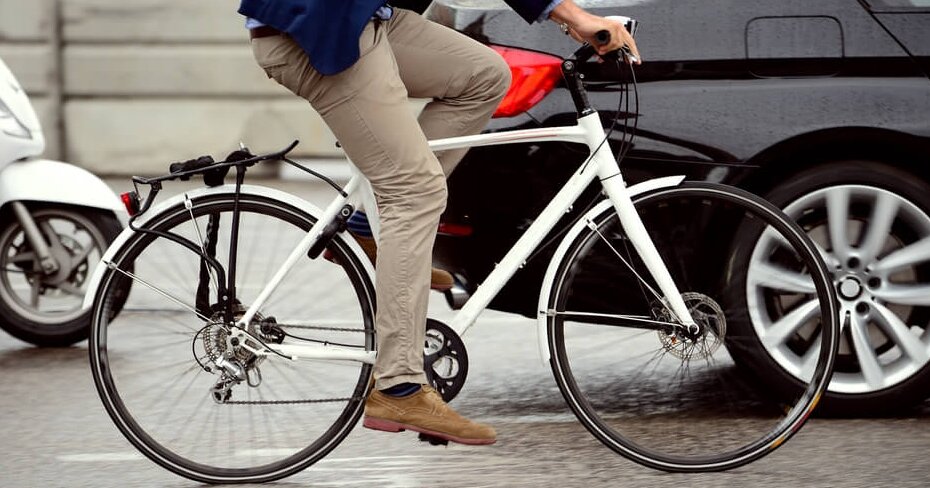Do you need auto insurance if you decide to get rid of your car?
By: Jessica Mach on August 6, 2024
Between the high costs of car ownership and the hassle of parking, there are lots of reasons to ditch the commute and hop on your bike to get to work.
If you’re thinking of going car-free, you’re not alone. In a survey conducted in December by car share marketplace Turo, 46% of respondents said inflation rates have made them less likely to buy or lease a car in 2024 — an increase from the 39% the previous year.
Moreover, over half of millennial were more likely to consider giving up their cars due to inflation.
It’s not hard to see why. If you live in a city with reliable public transportation or bike lanes, using these alternative modes of transportation could translate to both big savings and a smaller carbon footprint.
The growing availability of rideshare and car share services also make the prospect of going car-free less daunting than it used to be. Now, it’s easier than ever to get temporary car access for Facebook Market hauls or weekend jaunts out of town — without the monthly burden of car payments and insurance premiums.
However, you should know a few things before parking your car for good.
Why give up your car?
Of course, going car-free is not a viable option for everyone. If you have young children, live with a disability that makes it challenging to bike or take public transit, care for elderly relatives, or live in a place where public transportation is not reliable, any benefits you might gain from giving up your car might be far outweighed by the conveniences of having your own vehicle.
If you don't need a car, however, there are a variety of financial, practical, health, and environmental benefits to ditching the drive.
Saving money
The most obvious reasons to go car-free are financial. Consider how much of your budget is allocated to car expenses: auto loan or lease payments, gas, maintenance, repairs, auto insurance, parking fees, and winter tires.
For many people, that amount exceeds the expenses of monthly bus passes or bike maintenance even when those options are supplemented by occasional fees for rideshares, car shares, or car rentals.
Improving your health
There are a few significant health gains to be had by giving up your car. We all know that replacing your commute with walking and biking improves your cardiovascular health. However, it also reduces the amount of dangerous pollutants from your car’s tailpipe from entering your lungs, while keeping the air in your community clean.
Decreasing your carbon footprint
Even though cars are getting more and more fuel efficient, with more EVs and hybrid vehicles on our streets, transportation (including passenger cars) still remains Canada’s largest source of carbon emissions. That makes swapping your car for a bus or walking one of the most impactful things you can do to help curb climate change.
You’ll never have to worry about parking or traffic
If you live in a city where a parking spot is not always guaranteed or easy to find (ever lived in a building that only offered street parking?), going car-free takes another practical burden off your shoulders. And while you’re at it, you can say goodbye to the frustration of being stuck in traffic during rush hour.
What happens to your auto insurance if you decide to cancel it and come back to it later?
Canceling your auto policy without having back-up insurance in place generally results in a lapse, or a gap, in coverage. According to Rob De Pruis, a national director with the Insurance Bureau of Canada (IBC), different jurisdictions will have different rules for drivers who come back after a lapse.
In Alberta, for example, a lapse of under two years likely won’t impact your insurance premium if you decide to get new insurance later on.
“But if you have a lapse that lasts longer than two years, your insurance premiums can be impacted because you don’t have that same type of insurance history as if you had had continuous insurance,” he adds.
Meanwhile, Ontario insurers are not allowed to take a driver’s insurance coverage lapse into account when calculating their premiums, so lapses of any length are unlikely to lead to a premium increase except in specific circumstances, De Pruis says, like if the driver illegally drove during the coverage lapse.
If you’re looking to give up your car but plan on driving again in the future, make sure you look up the rules for the province or territory you live in so you know what — if any — premium changes can you expect.
Keep in mind that proactively deciding to get rid your auto insurance policy is different from your insurer deciding to cancel your policy for you, which can happen when you miss payments, commit fraud, have your license suspended, or file too many claims.
If your insurer cancels your policy and you get a new one later, you will likely face higher premiums.
Read more: How a gap in your car insurance history can affect your rate
Should you cancel your auto insurance when you want to just store your car?
Auto insurance is mandatory if you want to drive your car on the road, with varying minimum insurance requirements between provinces and territories.
However, when you store your car and don’t plan on taking it on the road, you no longer need mandatory auto insurance coverage, De Pruis says.
Some people may keep comprehensive coverage for their stored car. Comprehensive coverage offers financial protection from virtually all perils that could impact your car — earthquakes, fire, lightning, hail, and theft.
He adds that a policy that only offers comprehensive coverage could provide peace of mind in case of non-road-related perils.
Should you cancel your auto insurance if you’re switching to car share or car rentals?
Car share and rental car insurance differs from company to company. While the company — i.e., the vehicle owner — is typically responsible for insuring each car, that coverage may only meet minimum insurance requirements.
De Pruis recommends carefully reading the car share policy agreement to make sure that in the event of a collision, you’re protected.
“If you’re involved in an accident where you’re at fault, are you responsible for those damages?” De Pruis says. If that’s not mentioned in the policy document, De Pruis recommends getting non-owner car insurance.
“You can get coverage for non-owned vehicles that essentially protects you from situations like this, where you’re using someone else’s vehicle,” he says.
Always make sure you understand the terms of your rental or carshare, and if necessary, talk to an insurance broker to see what non-owner car insurance options are available. An added sense of security could be worth the extra costs.
Lastly, if you’re planning on borrowing a friend, partner, or relative’s car more frequently, make sure their policy has adequate coverage for a secondary driver (also known as an occasional driver).
Giving up your car could improve your finances, health, and the environment. But you don’t need to stop driving completely. Understanding the insurance implications of going car-free can help to make the transition smoother, and keep you protected the next time you find yourself behind the wheel.
Save 23% on average on car insurance
Compare 50+ quotes from Canadian providers in 3 minutes.

.jpg?itok=88nBkwga)
.jpg?itok=W5fSKczJ)